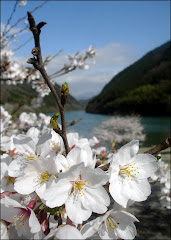 Geiko pose with two children of "double" heritage. Seeing this made me wonder... What will happen when Japan's new generation of multi-ethnic daughters grow up with an intrest in traditional culture and the desire to become a geiko? Obviously that is the very least of the questions that face Japan today, as it struggles to come to terms with Japanese citizens that don't quite fit their definition.
Geiko pose with two children of "double" heritage. Seeing this made me wonder... What will happen when Japan's new generation of multi-ethnic daughters grow up with an intrest in traditional culture and the desire to become a geiko? Obviously that is the very least of the questions that face Japan today, as it struggles to come to terms with Japanese citizens that don't quite fit their definition. Children with one Japanese parent and one non-Japanese parent are refered to as "half" here in Japan, a term most foreigners take acception to. Below is a quote from my fellow JET blogger, Gaijin For Life. His blog is witty, insightful, well-written, and all around much better than mine! Plus he has a super kawaii daughter (^-^). Read it. You won't regret it.
"I am not sure what children of "mixed marriages" are called in other countries, but here in Japan they are called "Half." I suppose that this is an implied reference to such a person's half that is lacking--that portion of them that is not Japanese. As for myself, when I was a kid growing up in Japan I always called them "half-n-halfs" but everyone thought I was talking about coffee. Now that I have a daughter who falls into the category under discussion, I use the term "Double." No one else does, but that must be because they are all under some sort of misconception. My daughter has two citizenships, a double portion of genetic diversity, and will soon speak two languages and carry two passports. That sounds like 1 times 2 to me, not 1 divided by 2."




4 comments:
Can we get a link to that blog
That's such a wise statement. Definately more of an good then, rathar then less!
yeah I like that term. I'm half chinese half anglo and I think it's more of a doubling than a halving, being from 2 cultures. although at times i've felt like a 1-1=0! i.e. ignorant of both haha. maybe that's why i'm somewhere "else" (Japan)
Oh ethnicity... wouldn't it be nice if it acutally worked out that way, doubling instead of dividing?
Some excellent books about what it means to wrestle with one's ethnicity by Canadians: Diamond Grill (Fred Wah), The Electrical Field, Jade Peony (Wayson Choy... I think), Obaasan.
I just finished doing some readings about 2nd generation Japanese-Canadians who were interned during world war two. I couldn't help but wonder what happened to those who refused to relocate and were sent back to Japan without any knowledge of the country or language... No english records of them seem to exist.
Post a Comment